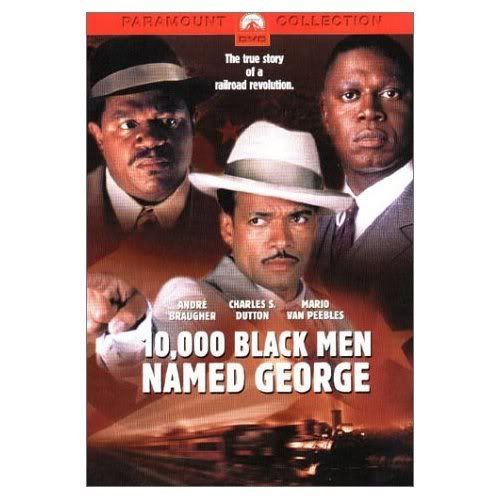
from amazon reviewer Anyechka
This film covers the 12-year period from 1925-37, and all of the struggles that the African-American porters who worked for the George Pullman Railroad Company went through on their way to becoming successfully unionized. It seems so unthinkable and morally reprehensible that not so long ago in history, these hard-working men were allowed to be treated this way, like being beaten up, all called "George" instead of by their real names, ordered around, given tips for doing things like shining passengers' shoes or even barking like a dog, being at the white passengers' beck and call, being accused of stealing company property when it was the white passenger who had been attempting to steal the trains' linens, and fired just because they'd dared to attend meetings about unionizing. And because of the situation at the time, they couldn't protest, since making only $60 a month was still better than having no job.
When the movie starts, in 1925, American society is on the up-and-up, with unions, organized labor, and Socialism not exactly being very popular or approved-of causes, with a lot of hatred, mistrust, and fear directed towards them. Initially, Asa Philip Randolph meets with a lot of resistance when trying to even start a movement for organising the porters. However, he has the advantage of not being a porter and therefore being unable to be fired from that line of work, and he has such great organising skills and such persuasive and impassioned rhetoric that eventually even people who were initially against the idea come over to his side. Along the way the porters and their allies have to put up with things like spies, attempted intimidation by the white men running the Pullman corporation, firings, accusations of Bolshevism, criminal violence, and attempted bribery by the Pullman execs who want Randolph to step down and stop what he's doing. Even when things finally seem to be going their way when FDR is sworn in as president, with more sympathy for organised labor and the working-class, there are still obstacles put in their way by the white establishment, people who just can't grasp that this union is going to happen whether they like it or not, that there's much too much support for it for their old tactics of fear, intimidation, and random illegal unjustified firings to still succeed and go unprotested. They thought it would or could never happen, but it finally did.
This movie is a powerful and moving history lesson and should be required viewing for everyone, whatever their race. Though there's still a lot of racism in America today, at least it's not as awful or as institutionalized as it was back in the Twenties and Thirties. Thanks to people like A. Philip Randolph, Milton Webster, and Ashley Totten, today African-American laborers have a right to be paid more than just $60 a month, the right to speak up when they're mistreated by racists, and most of all the right to be treated like human beings instead of sub-humans all branded with the name George.

















